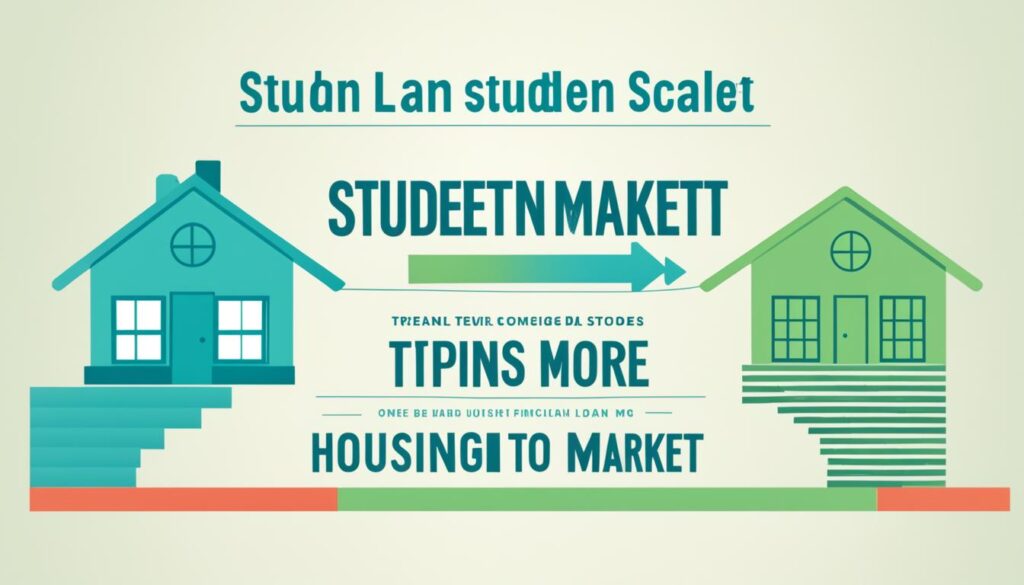Did you know that approximately 7 out of 10 students graduate with student loan debt, which can significantly impact their ability to save for a down payment on a home1? With over 44 million Americans carrying a staggering total of around $1.5 trillion in student loan debt, the dilemma of whether to prioritize house savings or pay off student loans is a pressing concern for many1. Given the current landscape of interest rates—where average student loan rates hover between 5% to 7% while mortgage rates range from 3% to 4%—it’s essential to assess your financial planning strategy carefully2. The path you choose should not only align with your immediate financial situation but also consider long-term goals, as the average down payment for a home lies between 6% to 15% of its selling price1. Balancing between these two financial commitments can pave a way for strategic savings, reducing overall interest paid over time.
Key Takeaways
- Understanding the impact of student loan debt on your house savings is crucial.
- The current interest rate environment influences financial decisions regarding student loans and mortgages.
- Both house savings and paying off student loans require effective financial planning.
- A larger down payment can minimize long-term mortgage costs.
- Finding balance between savings for a home and paying off debts can lead to better financial health.
Understanding the Financial Landscape
The current financial landscape reveals a complex interplay between student loan debt and housing market trends that significantly affect prospective homeowners. Millions of Americans are grappling with substantial student loan debt, which not only impacts their financial stability but also their ability to enter the housing market. Understanding these dynamics is critical for making informed decisions.
Overview of Student Loan Debt in America
As of recent data, the average monthly payment for student loan debt is around $203. Federal loans, which typically have lower interest rates compared to private loans, vary from 5.50% for undergraduates to as high as 15% for private loans3. With the nationwide statistics showing that 43% of U.S. adults with a credit card balance cite emergency or unexpected expenses as the cause for their ongoing debt, the pressure of student loan repayments is compounded4. In addition, only 44% of Americans feel prepared to handle an unexpected expense of $1,000, demonstrating the precarious financial situations many find themselves in4.
Current Housing Market Trends
Housing market trends indicate a cautious environment where potential buyers face escalating prices and fluctuating mortgage rates. Recent surveys suggest that individuals are prioritizing either debt repayment or boosting emergency savings, with 36% focusing on both activities simultaneously4. As interest rates increase, the opportunity for mortgage savings may diminish, making it imperative to assess the situation carefully before committing to homeownership.

| Type of Loan | Average Interest Rate | Average Monthly Payment | Emergency Fund Necessity |
|---|---|---|---|
| Federal Loans | 5.50% – 7.05% | $203 | Three months of expenses |
| Private Loans | Up to 15% | Varies | At least 44% of savings needed for emergencies |
In navigating this financial landscape, understanding the implications of student loan repayment on future housing opportunities is essential for anyone looking to own a home.
Benefits of Saving for a House
Homeownership presents numerous advantages that extend beyond having a place to live. Understanding these benefits is crucial for potential buyers navigating the choice between renting vs. buying. One of the key benefits of saving for a house is the opportunity to build equity and secure financial advantages over time.
Building Equity Through Homeownership
Building equity is one of the most significant advantages of homeownership. Every mortgage payment contributes to increasing your ownership stake, unlike renting, where payments help only the landlord. The Consumer Finance Protection Bureau (CFPB) suggests that mortgage borrowers maintain a debt-to-income ratio (DTI) of 36% or less, allowing for better management of monthly payments and stability in homeownership. As the property value appreciates, homeowners can enjoy substantial profit upon selling their homes in the future, making homeownership a compelling wealth-building strategy. The National Association of Realtors (NAR) has reported a 13.4% median sales price increase of existing homes between June 2021 and June 2022, showcasing the potential for increased equity during ownership5.
Potential Cost Savings Compared to Renting
In evaluating the costs, potential buyers often wonder about cost savings compared to renting. Though the initial investment in a home can feel daunting, especially with the average 20% down payment totaling $15,023, the long-term financial benefits can outweigh these costs5. According to research, nearly half of first-time homebuyers reported that student debt delayed their ability to save for a down payment, highlighting the importance of disciplined savings and planning6. Renting may seem cheaper short-term, but it does not contribute to building equity, leading to potential long-term financial stagnation.

| Factor | Renting | Buying |
|---|---|---|
| Equity Built | None | Increases equity over time |
| Monthly Payments | Pay rent monthly | Mortgage payments build ownership |
| Investment Growth | Stable costs | Potential appreciation of home value |
| Repairs & Maintenance | Not responsible | Potential costs of 1% – 4% of home value annually |
Considering the benefits of saving for a house is essential for anyone contemplating their financial future. The combination of building equity and enjoying potential cost savings can lead to a more secure financial situation over time5.
Arguments for Paying Off Student Loans First
Considering the financial implications of student loans versus other debts, it is essential to evaluate the arguments for paying off student loans first. This decision often involves analyzing interest rates, debt-to-income ratio, and the psychological benefits of being debt-free.
Impact of Interest Rates on Long-Term Costs
Understanding the impact of interest rates on student loans is critical. Typically, student loans have lower interest rates compared to other forms of debt, making them more manageable despite their cumulative total over time7. Prioritizing the repayment of higher interest debts, if applicable, can lead to significant savings. In some cases, refinancing student loans with a private lender might result in a more favorable interest rate, further reducing long-term costs7. Paying off student loans sooner prevents the accrual of additional interest, vital for maintaining financial stability.
Debt-to-Income Ratio Considerations
The debt-to-income ratio plays an essential role when assessing financial health. A higher ratio may limit opportunities for borrowing, such as obtaining a mortgage. With 6-12 months of living expenses as an emergency fund regarded as a prudent strategy8, maintaining a favorable debt-to-income ratio is crucial. Managing student loan debt effectively can enhance one’s ability to qualify for future loans, which may impact purchasing a home or other significant investments.
Psychological Benefits of Being Debt-Free
Living a debt-free lifestyle yields various psychological benefits. The relief associated with paying off student loans first can alleviate financial stress and promote mental well-being. Individuals often report a sense of accomplishment, which contributes to overall happiness and life satisfaction. Embracing the psychological benefits of debt-free living encourages a positive mindset, enhancing productivity and future financial decisions. Focusing on paying off student loans first might foster a rewarding journey toward financial independence.
Should I save for a house or pay off student loans?
Deciding whether to save for a house or pay off student loans involves nuanced financial decisions that depend greatly on individual circumstances. For instance, federal student loans typically carry interest rates between 3.4% and 3.8%, which can influence the prioritization between home savings and loan repayment9. Additionally, an individual with an income of $130,000 has a potentially favorable debt-to-income ratio, making them more equipped to handle both responsibilities, provided they manage their expenses prudently9.
When weighing the options, personal financial readiness plays a crucial role. Estimates suggest that deferring student loans may not significantly affect immediate mortgage approval, but the payment obligations will factor into future calculations10. It’s generally advisable to maintain manageable monthly payments—approximately $220 for student loans9—to indicate a stronger position for mortgage application10. Furthermore, having savings for a down payment, ideally over 20% of the home’s value, coupled with an emergency fund, is essential for a sustainable home-buying process11.
Ultimately, individual goals, market conditions, and short-term financial capabilities should guide this decision-making process. Real estate purchases require a long-term commitment—breaking even can take around five to seven years11. By thoughtfully evaluating whether to save for a house or pay off student loans, one can make informed choices that align with their aspirations and financial realities.
FAQ
Should I prioritize saving for a house or paying off my student loans?
How does student loan debt affect my ability to get a mortgage?
What are the benefits of paying off student loans first?
Are there any advantages to saving for a house instead of focusing on loan repayment?
How do interest rates influence my decision between saving for a house and paying off loans?
What are some effective budgeting strategies for managing both goals?
Can loan forgiveness programs ease my decision?
How can I determine my financial readiness for homeownership?
Source Links
- https://www.investopedia.com/personal-finance/save-down-payment-or-pay-student-loans/
- https://www.experian.com/blogs/ask-experian/should-you-save-for-a-down-payment-or-pay-off-student-loans/
- https://www.nerdwallet.com/article/loans/student-loans/save-invest-pay-off-student-loans
- https://www.bankrate.com/banking/savings/these-guidelines-will-help-you-decide-whether-to-pay-down-debt-or-save/
- https://www.lendingtree.com/student/pay-off-student-loans-or-buy-house/
- https://money.com/save-down-payment-or-pay-student-loans/
- https://www.laurelroad.com/refinance-student-loans/the-pros-and-cons-of-paying-off-student-loans-early/
- https://www.moneycrashers.com/pay-off-mortgage-student-loans-first/
- https://www.bogleheads.org/forum/viewtopic.php?t=410411
- https://www.amfam.com/resources/articles/money-matters/pay-student-loans-or-buy-house
- https://www.sofi.com/learn/content/pay-off-student-loans-before-buying-house/

